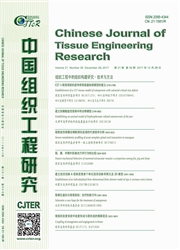

 中文摘要:
中文摘要:
背景:肺癌患者永久或暂时植入生物材料后可能发生以生物材料为中心的感染。目的:分析肺癌患者以生物材料为中心感染与外周血转化生长因子β1之间的关系。方法:纳入248例体内留置血管内插管〉7d的肺癌患者,定量法行插管细菌学培养和配对血液培养,阳性者用API细菌鉴定系统进行种属鉴定,同时用酶联免疫吸附法检测患者与75名健康志愿者外周血转化生长因子β1水平。结果与结论:以生物材料为中心感染阳性者82例,以生物材料为中心感染阴性者166例,其中确诊为插管相关性血流感染13例。检出革兰阳性菌48株,革兰阴性杆菌24株,真菌10株。以生物材料为中心感染阳性组外周血转化生长因子β1水平较阴性组高(P〈0.05);以生物材料为中心感染阴性组外周血转化生长因子β1较正常组高(P〈0.05)。说明医源性感染导致肺癌患者并发体内以生物材料为中心感染发生的病原菌种属多样化,以革兰阳性菌多见;检测肺癌患者转化生长因子β1因子对早期预防以生物材料为中心感染有积极意义。
 英文摘要:
英文摘要:
BACKGROUND: Permanent or transient implantation of biomaterials can result in biomaterials-centered infections (BCI) in lung cancer patients. OBJECTIVE: To investigate the relationship between BCI and peripheral blood transforming growth factor β1 (TGF-β1) in patients with lung cancer. METHODS: A total of 248 lung cancer patients undergoing in vivo intravascular catheter indwelling 7 days were included. Quantitative method was used for intubation, bacteriological culture and paired blood culture, and API Staph strips were adopted for positive patients. While enzyme-linked immunosorbent assay was used to detect TGF-β1 levels in the peripheral blood of patients with lung cancer and 75 healthy volunteers as normal controls. RESULTS AND CONCLUSION: Among the 248 patients, there were 82 BCI-positive cases, and 166 BCI-negative cases. Thirteen patients were confirmed to have catheter-related bloodstream infection. There were 48 Gram-positive bacteria, 24 Gram-negative bacilli, and 10 fungal. The levels of TGF-β1 were higher in BCI-positive patients than BCI-negative patients(P 0.05); the levels of TGF-β1 in the BCI-negative group were higher than those in the normal control group (P 0.05). For lung cancer patients with nosocomial infection induced BCI, there are various species of pathogenic bacteria, and Gram-positive bacteria are more common. To detect TGF-β1 levels in patients with lung cancer is of significance for early prevention of BCI.
 同期刊论文项目
同期刊论文项目
 同项目期刊论文
同项目期刊论文
 期刊信息
期刊信息
